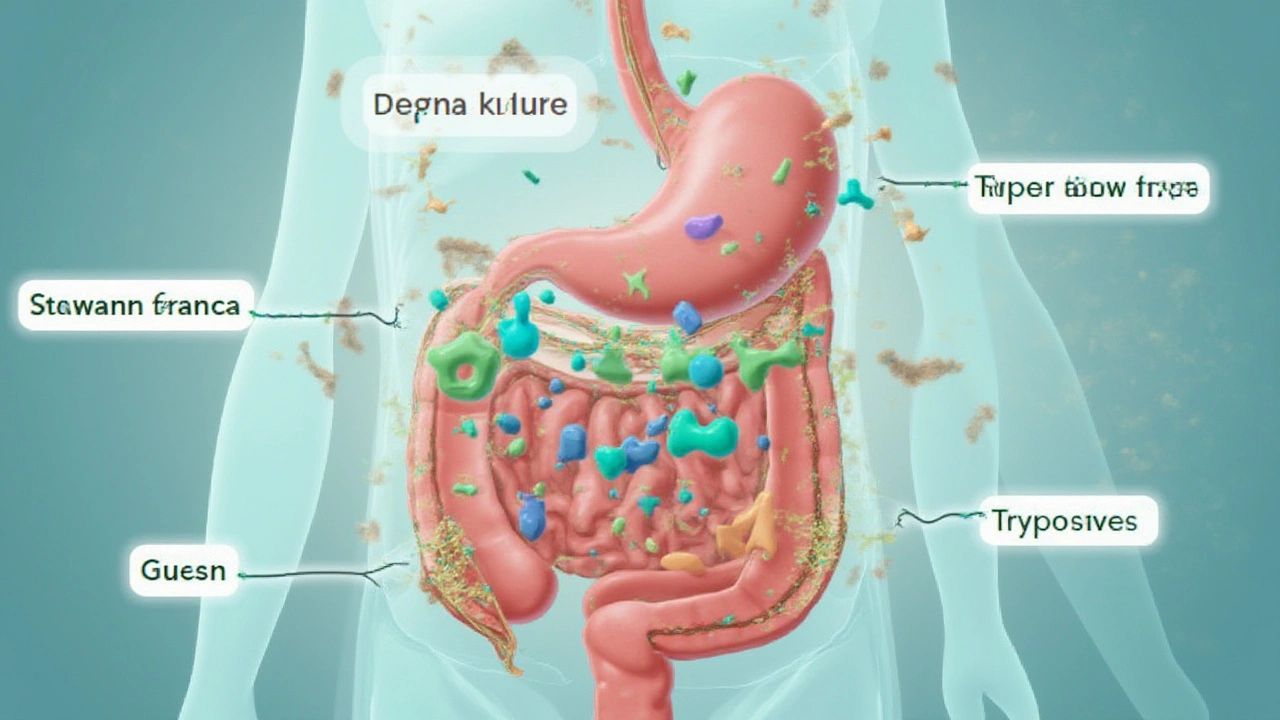Eating a big plate of protein-packed grilled chicken feels satisfying until your stomach starts reminding you it’s got work to do. Sound familiar? Behind the scenes, enzymes in your digestive system are hustling hard, and one of the behind-the-curtain stars is trypsin. Not many people think about digestive enzymes after their school biology lessons, but if you ever wonder why some folk can enjoy heavy meals without feeling sluggish, the answer might just be in how well they make use of enzymes like trypsin. Unlike most of the human body’s helpers, you can’t see or feel them—yet, their effect can be the difference between an energized afternoon and a nap-inducing food slump.
What Is Trypsin and How Does It Work?
So, what actually is trypsin? If you picture your digestive system as a game of dominoes, with each piece knocking the next into play, trypsin would be one of the first tiles. It’s a protein-splitting enzyme, part of a crew produced by your pancreas. Once it hits your small intestine, which is about 6 metres long in adults (no kidding), trypsin jumps into action. Its main job? Breaking down large, complicated proteins into much smaller bits called peptides, then even tinier amino acids. Your body can’t absorb big protein molecules, so without this step, all the eggs, lentils, or beef you eat would simply head for the exit, undigested.
The fun fact here: trypsin isn’t actually active in the pancreas itself. It’s stored as a harmless version called trypsinogen, waiting for a signal to get moving. When your stomach empties partially digested food (called chyme) into the top of your small intestine, other gut enzymes snip a bit off trypsinogen, activating it as trypsin. It’s like unlocking a door, allowing the enzyme to start work at exactly the right place—no sooner, otherwise you'd risk the enzyme digesting your pancreas. In fact, problems with premature trypsin activation can cause nasty issues like pancreatitis, but thankfully, our bodies have evolved some pretty impressive safety checks for that.
Trypsin isn’t solo in this process. It's part of a dream team with chymotrypsin and carboxypeptidase. Imagine trypsin as the main opener, making the first big cuts in a long rope. Only then can its teammate enzymes finish chopping things into single amino acids, ready for absorption into your blood. Those amino acids get sent all around your body to help build skin, hair, hormones, you name it. Next time you bite into a protein bar, remember: without trypsin, your body’s protein factory would be out of business.
Curious about how vital trypsin is? Scientists figured this out the hard way by studying people and animals who lack enough pancreatic enzymes. They tend to develop a condition called exocrine pancreatic insufficiency (EPI), resulting in poor absorption, bloating, frequent bathroom visits, and even muscle weakness. Supplements containing trypsin and other enzymes are widely used for these folks, giving them back the power to digest and absorb nutrients. That’s how essential this enzyme really is.
The Everyday Impact of Trypsin on Your Gut Health
Let’s get personal: how is this background biology changing the way you feel after meals? People often talk about gut health in broad terms, throwing around words like “microbiome” and “probiotic”, but the nuts and bolts—the enzymes—get left out. If your trypsin is doing its job well, you’ll find yourself with steady energy, less bloat, and more reliable digestion after heavy, protein-rich meals. Not only does that mean fewer uncomfortable bellyaches, but it helps you get the most nutrition out of what you eat. Proteins aren’t just about muscles—they’re key players in immunity, mood, skin, and brain function too.
When your digestive enzymes, including trypsin, are running low or working inefficiently, your whole system feels it. Symptoms creep in: frequent indigestion, unpredictable bowels, bad breath (from proteins fermenting in your gut), and even fatigue. If this sounds all too familiar, it’s not just a quirk of aging or stress—it could be a sign that your digestive enzymes, like trypsin, aren't keeping up. People who struggle with chronic pancreatitis or cystic fibrosis know this all too well, but even healthy folks can see their digestive enzyme levels drop due to certain medications, alcohol, smoking, viral infections, or simply with age.
There’s another angle to think about here: food intolerances. When proteins aren’t broken down well, your immune system sometimes mistakes them for invaders, triggering subtle reactions that mimic food allergies. While classic allergies involve the whole immune system, these reactions are sneaky and often just result in bloating, tiredness, or skin flare-ups. Historically, researchers studying trypsin found that people with enzyme deficiencies not only felt worse after meals but were more likely to develop “gut permeability” (yep, that’s what folks call 'leaky gut'). This lets unwanted particles sneak through your gut lining, causing immune reactions or inflammation elsewhere.
Gut health is closely tied to mental and emotional well-being. Ever get butterflies before a big event? There’s a reason scientists call your digestive tract the “second brain.” Poor digestion messes not only with your body, but creeps into your mood, ability to focus, and even your sleep quality. Ensuring that your trypsin levels are on point can help keep every part of you running more smoothly. People who start supplementing digestive enzymes (after a chat with their GP) often notice better focus, lighter moods, and a less cranky stomach within weeks.

How To Naturally Support Trypsin and Boost Digestion
You don’t need a chemistry set to make the most of your digestion. While some folks need prescription enzyme supplements, most people (especially under 50 and without existing conditions) can support their trypsin production with a few practical habits. First up: chewing. Sounds basic, but giving your meal a proper chew breaks food into smaller pieces, making it easier for trypsin to get to work. Try counting 20 chews per bite—you'll soon notice you're fuller on less food, too.
Eating on a regular schedule helps keep your pancreas in rhythm. Irregular meal times can stress your digestive system, impacting the release of enzymes like trypsin. Aim for consistent meal times, ideally with some routine (like a proper breakfast, lunch, and dinner) instead of random snacking. Heavy drinking is bad news, too; alcohol can damage the cells that make digestive enzymes. Same goes for smoking—quitting gives your enzymes a better shot at working efficiently.
Including certain foods in your diet can be a game-changer. Papaya and pineapple, for instance, have their own families of enzymes (like papain and bromelain), but studies show they may also help stimulate your own body's enzyme production. Fermented foods like yoghurt, kimchi, sauerkraut, or kefir naturally support a healthy digestive environment, making it easier for your body to produce and use enzymes. Don't forget a balanced diet with enough vitamins and minerals, as deficiencies in zinc or vitamin B6, for example, can mess with your enzyme production.
Stress is a digestive system killer. When you’re anxious, your body redirects energy away from digestion—what’s called 'fight or flight'. That means fewer enzymes, including trypsin, end up in your gut. Simple tricks like deep breathing before dinner, or taking a walk after a big meal, can make a real difference. Some people swear by gentle abdominal massage or a couple of yoga poses after eating to keep things moving. And don't ignore sleep: your gut does a lot of its repair work at night, including replenishing enzymes.
One thing that can't be ignored: stay hydrated. Water is vital, not just for your system as a whole, but to allow your pancreas and small intestine to secrete and activate enzymes properly. You don’t need fancy detox drinks—just enough plain water to keep your urine pale is a great target. If you’ve been prescribed antibiotics, remember they can sometimes mess up your gut flora, and an unhealthy gut microbiome can indirectly sabotage enzyme efficiency. If that happens, adding probiotics back into your diet is a safe bet.
When and How To Ask For Help: Trypsin Deficiency and Supplements
Sometimes, no matter how pristine your diet or how often you exercise, your body just isn’t making enough trypsin. This is especially likely if you’ve had health problems like chronic pancreatitis, celiac disease, cystic fibrosis, or even after certain stomach surgeries. Classic signs that something’s amiss: persistent bloating, unexpectedly greasy stools (which float and are hard to flush), dramatic weight loss, or a drop in muscle mass despite keeping up your protein intake. If these sound familiar—especially if they stick around for weeks—it’s worth booking a chat with your doctor. They can arrange simple stool tests to see if you’re absorbing nutrients properly, or blood tests to check related markers.
Here’s where supplements come in. Doctors can prescribe something called pancreatin, a mix that includes trypsin, chymotrypsin, and lipase. Brand names vary, but what matters is making sure you’re getting the right dose for your needs. These pills are usually taken right before or during meals, so they help with digestion in real-time. Good news: side effects are rare, but taking them properly is key—never crush or chew, as these pills are coated to dissolve in your intestine, not your mouth or stomach. Taking enzyme supplements without a real deficiency can sometimes cause problems, so don’t be tempted by online promises without medical advice.
It’s not all about prescription drugs. Plant-based digestive enzyme blends have popped up in high street health shops lately. While these can be helpful for some people, especially if you struggle after big holiday meals or notice your digestion isn’t what it used to be, they shouldn't replace a visit to your GP if you constantly feel unwell. For those just looking for a digestive boost, taking a short supplementary break once or twice a year—rather than daily use—can be enough to help your gut reset.
Lastly, don’t go overboard with protein-heavy diets if your digestive system isn’t ready to cope. People who dramatically ramp up their protein intake without supporting their enzymes can feel worse, not better—more isn’t always more when it comes to nutrients. Ease new foods in gently, and notice how your body reacts. It’s your best clue to how well your trypsin is working. And if you’re curious about your risk factors or want to support a family member with digestive issues, don’t be afraid to ask questions. Digestive health isn’t a mystery to be solved alone.


Written by Felix Greendale
View all posts by: Felix Greendale